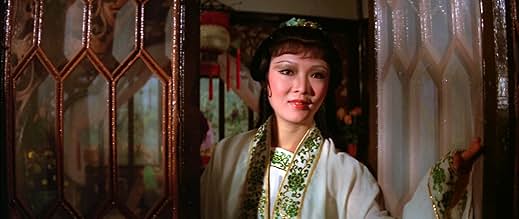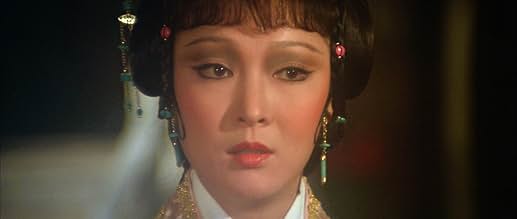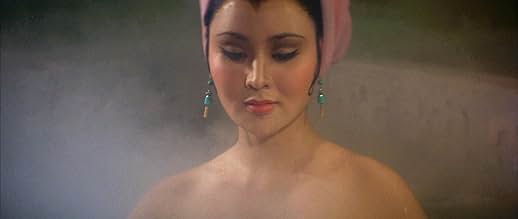Ren pi deng long
- 1982
- 1 घं 39 मि
IMDb रेटिंग
6.6/10
1.2 हज़ार
आपकी रेटिंग
अपनी भाषा में प्लॉट जोड़ेंA psychotic craftsman pits two rival Kung-Fu masters against each other while designing special lanterns from a disturbing source.A psychotic craftsman pits two rival Kung-Fu masters against each other while designing special lanterns from a disturbing source.A psychotic craftsman pits two rival Kung-Fu masters against each other while designing special lanterns from a disturbing source.
Tony Liu
- Master Lung Shu Ai
- (as Liu Yung)
Chen Kuan-Tai
- Master Tan Fu
- (as Kuan Tai Chen)
Lo Lieh
- Chao Chun-Fang
- (as Lieh Lo)
Susan Yam-Yam Shaw
- Guest at Fu's Banquet
- (as Yin Yin Shaw)
Fung Ging-Man
- Guest at Fu's Banquet
- (as Ging-Man Fung)
फ़ीचर्ड समीक्षाएं
Human Lanterns goes for broke and mostly works. It's gonzo stuff, being a cross between a martial arts movie and a murder-mystery about a deranged serial killer, all taking place hundreds of years ago (possibly longer).
I like it when a Shaw Brothers movie does something out of left field. This isn't my favorite example of the studio doing that, but it certainly has its moments - enough of them for this to end up being pretty decent. There's enough here that's fun to make it worth a watch for martial arts fans after something different.
It was let down a little, I felt, by being uneven. It committed to different levels of crazy at different points, and feels all-over-the-place as a result. That sense of chaos can work when it's pushed far enough often enough in a movie like this, but I don't feel like Human Lanterns always did the best job at this.
Still, for having some silly horror mixed in with some violent fight scenes, there was a good amount here that proved enjoyable. The kind of thing that gets a caution recommendation, for fans of this style of odd film, at least.
I like it when a Shaw Brothers movie does something out of left field. This isn't my favorite example of the studio doing that, but it certainly has its moments - enough of them for this to end up being pretty decent. There's enough here that's fun to make it worth a watch for martial arts fans after something different.
It was let down a little, I felt, by being uneven. It committed to different levels of crazy at different points, and feels all-over-the-place as a result. That sense of chaos can work when it's pushed far enough often enough in a movie like this, but I don't feel like Human Lanterns always did the best job at this.
Still, for having some silly horror mixed in with some violent fight scenes, there was a good amount here that proved enjoyable. The kind of thing that gets a caution recommendation, for fans of this style of odd film, at least.
Do we have the nameless individual that tricks two others to fight each other? Does that sound like a famous western with Clint Eastwood? Which also was copied ... well let's not go down that road. Especially because while there may be parallels, there also quite a few differences here too.
I've seen my share of Shaw Brothers movies, but I can't remember seeing this one. This is quite out there, with a character being a mixture of monkey and demon, with the evil mindset of a ... human (a bad human that is of course). Add to that horror some good old fashioned stunts and flying lessons ... and voila you got yourself a movie that might not be everyones cup of tea (if you're easily offended, don't even bother, there are quite a few scenes that are far from political correct), but works for those who love these movies ... and if you're one of them, you won't mind certain flaws as much as others do
I've seen my share of Shaw Brothers movies, but I can't remember seeing this one. This is quite out there, with a character being a mixture of monkey and demon, with the evil mindset of a ... human (a bad human that is of course). Add to that horror some good old fashioned stunts and flying lessons ... and voila you got yourself a movie that might not be everyones cup of tea (if you're easily offended, don't even bother, there are quite a few scenes that are far from political correct), but works for those who love these movies ... and if you're one of them, you won't mind certain flaws as much as others do
The English title is in many respects, unfortunate, as this is really a morality play dressed as a martial arts film with horror elements.
The film begins by introducing us to "Master Tan" and "Master Lung," two wealthy, but otherwise uncharacterized, rivals. Master Tan displays a lantern that he had made for the lunar festival. Master Lung responds that it is an object unworthy of esteem. Lung then decides that he will hire a former rival, Chao Fang (played by Lieh Lo of "Five Fingers of Death" fame), to craft an even better lantern. Fang agrees, but only on condition that Lung never return to his lair-like shop.
Of importance to the story-line is the fact that Lung had, in the past, fought Fang, and scarred Fang's face. Lung, we are to note, is a man who believes his money can right all past wrongs.
From this "bargain" involving three men and their fragile "honor" come the horrors; for what this story is really about is Fang and his own place in the social order. The bargain gives him his own chance to avenge perceived wrongs, even as he crafts the handiwork that will allow Lung to one-up his competitor. From (relatively) small slights come disaster.
Of the story-line, I will say little else, as this is a movie that runs less on plot development than allowing a dynamic that has been set in motion early-on play itself out through a set of highly choreographed martial-arts routines. I will, however, comment on a few technical aspects that impressed me:
First, with the exception of a few sequences shot outdoors (one quite memorable, shot in a grove of tall trees), this is a studio-set movie that takes place in just a handful of locations. The sets are simply arresting and, in some cases, quite beautiful. The costumes, set design and lighting are all very-well thought out and executed. (Comparisons to the early films of Mario Bava are warranted.) None of the sets are meant to represent "actual" places, but rather allegorical places: the peaceful, noble abodes of Tan and Lung; the boisterous market-place; the hellishly menacing, creepy shop of Fang--each is set in opposition to its counter-parts.
So, in what time period does "HL" take place, exactly? As with much of the Wuxia genre, the historical setting is not terribly important for the story-line. What matters are the character-types. That said, the Hanfu styles of dress indicate one possible (and remote) time-period. The appearance of the tiger hooks (used by the assassin character) bring us much closer to the present.
Second, the lighting, camera work and editing are impressive. For example, the first time we meet the monkey-ghost character, the lighting frames the face in a way that was quite memorable for this viewer. Director Sun Chung also uses slow-motion and fast-motion techniques, particularly in the acrobatic martial-arts segments. But he also dabbles with soft focus shorts at times (mostly for the abodes of the two principal characters). There are many, many places where "HL" is a sumptuous, beautiful film (and one that deserved a better English title.)
If I have a quibble, it is that the end of the film does not do justice to the careful pacing and style of what preceded it. There are quite a few veteran actors at work here (though it is Lo who steals every scene in which he is a part); I just wish the ending could have been written better. That said, a surprisingly good movie. I was not expecting it, quite honestly.
The film begins by introducing us to "Master Tan" and "Master Lung," two wealthy, but otherwise uncharacterized, rivals. Master Tan displays a lantern that he had made for the lunar festival. Master Lung responds that it is an object unworthy of esteem. Lung then decides that he will hire a former rival, Chao Fang (played by Lieh Lo of "Five Fingers of Death" fame), to craft an even better lantern. Fang agrees, but only on condition that Lung never return to his lair-like shop.
Of importance to the story-line is the fact that Lung had, in the past, fought Fang, and scarred Fang's face. Lung, we are to note, is a man who believes his money can right all past wrongs.
From this "bargain" involving three men and their fragile "honor" come the horrors; for what this story is really about is Fang and his own place in the social order. The bargain gives him his own chance to avenge perceived wrongs, even as he crafts the handiwork that will allow Lung to one-up his competitor. From (relatively) small slights come disaster.
Of the story-line, I will say little else, as this is a movie that runs less on plot development than allowing a dynamic that has been set in motion early-on play itself out through a set of highly choreographed martial-arts routines. I will, however, comment on a few technical aspects that impressed me:
First, with the exception of a few sequences shot outdoors (one quite memorable, shot in a grove of tall trees), this is a studio-set movie that takes place in just a handful of locations. The sets are simply arresting and, in some cases, quite beautiful. The costumes, set design and lighting are all very-well thought out and executed. (Comparisons to the early films of Mario Bava are warranted.) None of the sets are meant to represent "actual" places, but rather allegorical places: the peaceful, noble abodes of Tan and Lung; the boisterous market-place; the hellishly menacing, creepy shop of Fang--each is set in opposition to its counter-parts.
So, in what time period does "HL" take place, exactly? As with much of the Wuxia genre, the historical setting is not terribly important for the story-line. What matters are the character-types. That said, the Hanfu styles of dress indicate one possible (and remote) time-period. The appearance of the tiger hooks (used by the assassin character) bring us much closer to the present.
Second, the lighting, camera work and editing are impressive. For example, the first time we meet the monkey-ghost character, the lighting frames the face in a way that was quite memorable for this viewer. Director Sun Chung also uses slow-motion and fast-motion techniques, particularly in the acrobatic martial-arts segments. But he also dabbles with soft focus shorts at times (mostly for the abodes of the two principal characters). There are many, many places where "HL" is a sumptuous, beautiful film (and one that deserved a better English title.)
If I have a quibble, it is that the end of the film does not do justice to the careful pacing and style of what preceded it. There are quite a few veteran actors at work here (though it is Lo who steals every scene in which he is a part); I just wish the ending could have been written better. That said, a surprisingly good movie. I was not expecting it, quite honestly.
"Ren pi deng long," translated as "Human Lanterns," is a 1982 Shaw Brothers production that throws martial arts action into a blender with disturbing horror elements. The result is a bizarre concoction - a campy, uneven film that will leave you scratching your head while occasionally offering bursts of entertainment.
The plot revolves around a wealthy man, Lung Shu Ai, who desires a unique lantern for a festival. He hires the skilled craftsman Chao Fang, unaware of the simmering resentment Chao holds for Lung. This resentment stems from a past betrayal, and Chao decides to craft his revenge in a particularly gruesome way - by using human skin for the lanterns.
The fight choreography is decent for the era, featuring Shaw Brothers staples like lightning-fast kicks and acrobatic displays. However, the special effects haven't aged well, with the "human skin" looking more like cheap plastic. The real draw (or turn-off, depending on your taste) is the horror element. The film doesn't shy away from showing the skinning process, albeit with a level of camp that lessens the impact.
The acting is a mixed bag. The lead villain, Chao Fang, chews the scenery with gusto, bordering on parody at times. The hero, played with stoicism by Lieh Lo, provides a more grounded counterpoint. The narrative unfolds in a predictable manner, with the mystery of the lantern maker's identity revealed fairly early.
"Human Lanterns" is a film that thrives on its outrageous premise. It's undeniably exploitation cinema, pushing boundaries for the sake of shock value. If you're looking for a well-crafted horror film or a top-tier martial arts flick, you'll likely be disappointed. But for those seeking a cheesy, bizarre cinematic experience, "Human Lanterns" offers a campy thrill ride with some impressive fight sequences sprinkled in.
The plot revolves around a wealthy man, Lung Shu Ai, who desires a unique lantern for a festival. He hires the skilled craftsman Chao Fang, unaware of the simmering resentment Chao holds for Lung. This resentment stems from a past betrayal, and Chao decides to craft his revenge in a particularly gruesome way - by using human skin for the lanterns.
The fight choreography is decent for the era, featuring Shaw Brothers staples like lightning-fast kicks and acrobatic displays. However, the special effects haven't aged well, with the "human skin" looking more like cheap plastic. The real draw (or turn-off, depending on your taste) is the horror element. The film doesn't shy away from showing the skinning process, albeit with a level of camp that lessens the impact.
The acting is a mixed bag. The lead villain, Chao Fang, chews the scenery with gusto, bordering on parody at times. The hero, played with stoicism by Lieh Lo, provides a more grounded counterpoint. The narrative unfolds in a predictable manner, with the mystery of the lantern maker's identity revealed fairly early.
"Human Lanterns" is a film that thrives on its outrageous premise. It's undeniably exploitation cinema, pushing boundaries for the sake of shock value. If you're looking for a well-crafted horror film or a top-tier martial arts flick, you'll likely be disappointed. But for those seeking a cheesy, bizarre cinematic experience, "Human Lanterns" offers a campy thrill ride with some impressive fight sequences sprinkled in.
Chung Sun, who directed, amongst many other films, the superb "The Sexy Killer" (see review), is unable to make the elements gel in "Human Lanterns" aka "Human Skin Lanterns". Personally, I have always loved the idea of using human skin to make lanterns, so this film was an eagerly awaited one by me. Unfortunately, there's too little skinning and too much martial arts in this. In fact, the skinning scenes (there are two), while well done, feel like they belong in a different movie altogether. This is a strange effort to make a martial arts fantasy and cross it with a Hammer-style horror plot. It doesn't work. That said, "Human Lanterns" is still a sumptuously photographed and designed period piece. The Shaw's certainly spent big on its sets, cast and special effects. It's a shame they didn't focus more on the horror promised in the title. Disappointing horror. Satisfactory period-fu epic.
टॉप पसंद
रेटिंग देने के लिए साइन-इन करें और वैयक्तिकृत सुझावों के लिए वॉचलिस्ट करें
विवरण
- रिलीज़ की तारीख़
- कंट्री ऑफ़ ओरिजिन
- भाषा
- इस रूप में भी जाना जाता है
- Human Lanterns
- उत्पादन कंपनी
- IMDbPro पर और कंपनी क्रेडिट देखें
इस पेज में योगदान दें
किसी बदलाव का सुझाव दें या अनुपलब्ध कॉन्टेंट जोड़ें




































